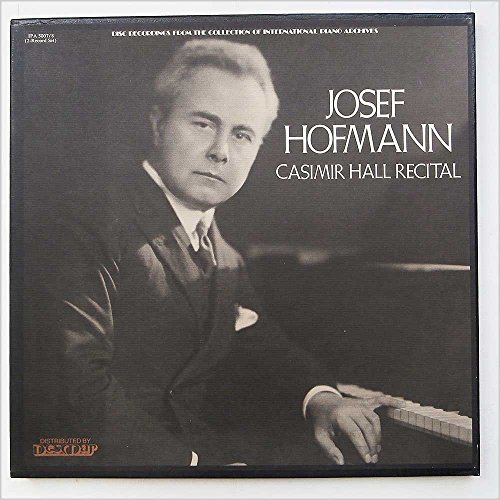Background
Josef Casimir Hofmann was born in Podgorze, Poland, on January 20, 1876.



(Format: Vinyl Record LP, IPA Records. USA release from 19...)
Format: Vinyl Record LP, IPA Records. USA release from 1976. Classical music LP release from Josef Hofmann. Box set with two LPs. Please note that the booklet is missing from this set. 11 tracks. Lovely fresh and clean copy.
http://www.amazon.com/gp/product/B00STMBZQY/?tag=2022091-20
Josef Casimir Hofmann was born in Podgorze, Poland, on January 20, 1876.
He became a pupil of Anton Rubinstein in 1883.
In 1885 he made a successful European tour, and in 1887 he arrived in the United States to give a series of 80 concerts.
He had played only 42 of these, however, when the Society for the Prevention of Cruelty to Children intervened and forced the cancellation of the remainder. At this point an anonymous benefactor, later disclosed to be Alfred C. Clark of New York, offered to support the Hofmann family until Josef reached the age of 18, provided he meanwhile made no further concert appearances; the offer was accepted, and Josef returned to Europe, where he studied under Rubinstein, Urban, and Moszkowski. He reentered public life with a recital at Dresden in 1894, and during the next 30 years he became famous as an outstanding pianist, particularly noted for his rendering of the works of Chopin and Schumann. When the Curtis Institute of Music, in Philadelphia, was founded in 1924, Hofmann was invited to head the piano department, and in 1926, the year he became a United States citizen, he was appointed director, a position that he held until 1938. He composed many works for the piano, as well as concertos, a symphony, and an orchestral suite, the majority under the pseudonym of Michel Dvorsky. He was the author of Piano Playing and Piano Questions Answered (1900).
A child prodigy, he gave a debut recital in Warsaw at the age of 5, and a long series of concerts throughout Europe and Scandinavia, culminating in a series of concerts in America in 1887-88 that elicited comparisons with the young Mozart and the young Mendelssohn.
Hofmann toured and performed extensively over the next 50 years as one of the most celebrated pianists of the era.
In 1913, he was presented with a set of keys to the city of St. Petersburg, Russia.
As an inventor, Hofmann had over 70 patents, and his invention of pneumatic shock absorbers for cars and airplanes was commercially successful from 1905 to 1928. Other inventions included a windscreen wiper, a furnace that burned crude oil, a house that revolved with the sun, a device to record dynamics in reproducing piano rolls that he perfected just as the roll companies went out of business, and piano action improvements adopted by the Steinway Company.
(Format: Vinyl Record LP, IPA Records. USA release from 19...)
